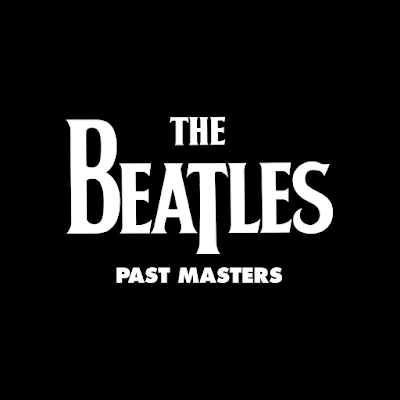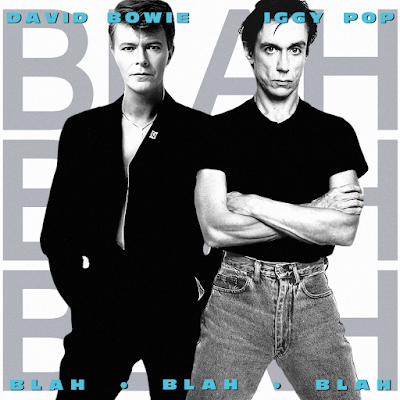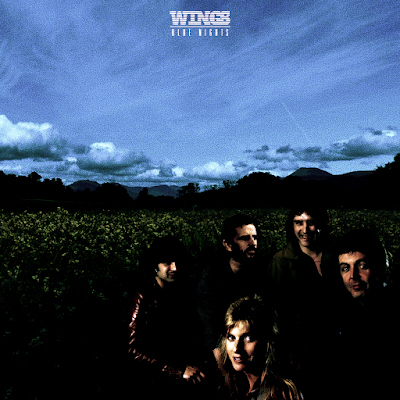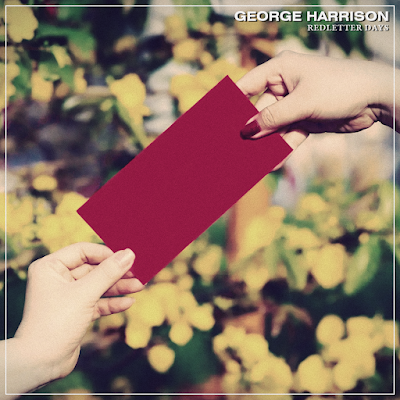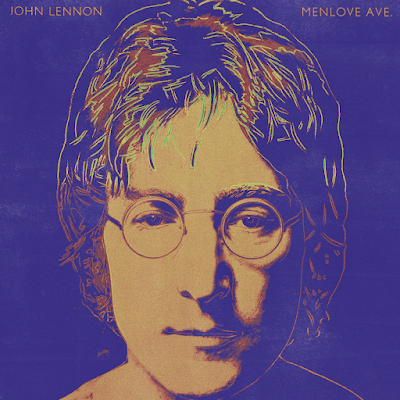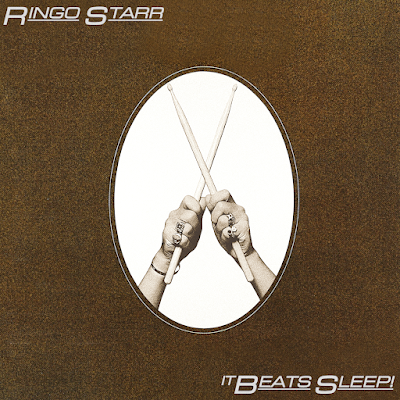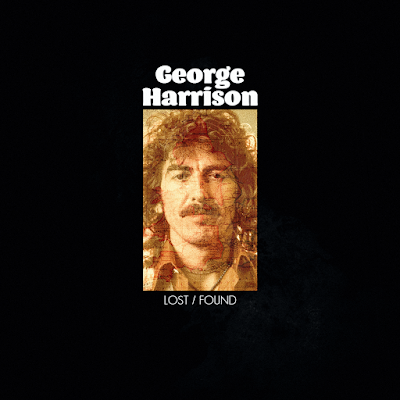Intermission: Past Masters I & II (1987)
Glass Spider - Glass Spider (1987)
Tin Machine never really existed. David Bowie had given those interviews to get the press off his back while his real intentions remained hidden. The idea of some sort of Beatles reunion had secretly enthralled him since their dissolution. He even considered Live Aid the best time for them to reunite, yet his idea failed when George Harrison and Ringo Starr failed to show up. But even his former bandmates were somewhat into the idea; all of them had played on each other's solo albums throughout the 80's, so the idea didn't seem as farfetched as some would think. Obviously the reason that it never happened was that John Lennon was dead, and it wouldn't be the Beatles without him. But what if it didn't have to be? He discussed the idea with Paul McCartney when he could, and they came to an agreement that would benefit everyone.
Until being contacted by Bowie, Harrison and Starr didn't even have music on the brain. Starr had recently recorded with Wings, but that was about it for musical activity up to that point. He was addicted to alcohol moreso than his drums, and it was blindly apparent. He may have been at a low point in his life, but Harrison was at a high point. While his last few albums weren't considered fantastic by any measure, he really didn't care. He spent his waking hours doing other things he loved and being with friends. Jeff Lynne, frontman of the recently broken-up ELO, was one that he spent the most time with, and the idea of making music together was bound to happen eventually. This would coalesce in Harrison's recording of Rudy Clark's "Got My Mind Set on You", produced by Lynne and released on January 12, 1987. This single alone would sell better than his last three albums, something that both embarrassed and fascinated Harrison. He finally thought to himself that there was a place for him in the current music scene after all.
With the other three former Beatles being free of musical obligations in early 1987, Bowie took the opportunity to finally ask the others to reform, not as the Beatles but under another name. This would not be just an excuse for the Beatles to come back, according to him, but to make music that the Beatles couldn't have imagined making even just 6 years ago. With that idea in mind, Harrison invited Jeff Lynne with him to fill a niche that had been missing before. Starr would only be let back in if he kicked his alcohol addiction. Going cold turkey would be tough, but Starr agreed, and with that, the lineup was complete.
When it came time to make music together again, something that came very natural to them at this point, it was decided that they would take the risk of using unorthodox playing and recording styles in an attempt to distance their sound from the Beatles. McCartney and Bowie, in particular, would experiment with writing longer and more experimental songs although still with a contemporary sheen. The classic Beatles sound would end up shining through on a select few tracks however, with the final track, Harrison's "Circles" straight up being a Beatles outtake from 1968. Lynne's two tracks were both outtakes from ELO's final album, Balance of Power, both reworked with a more grandiose sound and without as many synthesizers. Starr's only contribution was "Hard Times", a song he had previously contributed for Wings' Blue Nights. He had hoped that with the other Beatles, the song could be cleaned up and be made better, but the song was left off once again due to time constraints. When basic recording for the album had finished, the group didn't even have a name or any sort of identity yet. Bowie would name the group after one of his tracks, citing the inspiration came from the rut they had all fallen into following the Beatles' dissolution.
On April 21, 1987. The first album, self-titled, by Glass Spider released. While basically unknown to the public at the time, this was their first release with no singles preceding it, it was hyped up massively by Apple Records, with their plastered on every phonebook, billboard and even television commercial. For a band that no one had heard of until the release of their first record, Apple wanted this to succeed. The names of the individuals in the group weren't known either, the album lists everyone who contributed as simply "Glass Spider". This secret barely held for long though. As the listener started to play the first song and the first single released the same day, "Good Times Coming / Feel the Sun", it was noticeably Paul McCartney's voice he heard. Weird that he would release something not under his own name like that. But then he heard George Harrison's voice, and then David Bowie's voice, and soon enough, everyone knew what was happening. They were witnessing a Beatles reunion in real time, and, thankfully in Apple's case, everyone had found out around the same time. It's been said that a local radio station had obtained the single a few hours earlier, and the DJ's reaction could be heard as it was playing. The operation to keep the whole thing a secret had been a success.
As for the album itself, it was well received by both the public and critics, who praised the Beatles for not sounding like the Beatles. Songs like "Good Times Coming" and "'87 and Cry" were considered catchy, and the title track was called "ethereal". There were even Chinese-influenced songs written by Harrison and a protest song against the Catholic Church in "The First Stone". This album seemed to have everything a Beatles fan could want and more, and both the album and the single would reach #1 on their respective charts. Retrospectively, praise for the album has declined, citing massive hype for a Beatles reunion and its dated production for why it hasn't stood the test of time the way prior Beatles albums had. Regardless, Glass Spider was a success, and fans wanted more.
Time Will Crawl
 |
| Back cover |
David Bowie & Iggy Pop - Blah-Blah-Blah (1986)
Bowie's Silhouettes World Tour had ended in 1984, and he was left a wreck. It was his first large (mostly) drug-free outing in what felt like forever, and Bowie didn't have anything to keep him going. Bowie finished his Serious Moonlight album in mid 1984, and then he rested. Similarly to directly after the Beatles disbanded, he turned to films to keep him active. He had a starring role in Absolute Beginners and provided the title song that became a chart hit when it was released as a single. His only other major film outing during this time was Jim Henson's Labyrinth. Henson wanted him to star as Jareth in the film, but Bowie just didn't have it in him for another major film role. He did however work with Sting, formerly of the Police and the new actor for Jareth, in writing songs for the film that would come to be known as some of Sting's best solo work. For Bowie however, that was basically it when it came to big projects for the time being.
Until his dear friend Iggy Pop rang him up to help him on his new album. The two had met in 1971 and spent much time together in Berlin where each of them had a rebirth in their respective careers. Bowie accepted his offer, and he became the album's co-producer alongside David Richards. As the sessions went on, Bowie decided to pitch more and more of his own songs to Pop for use on the record (a few of these being songs that Bowie wrote for Labyrinth that went unused) until Pop had the bright idea to make it an official collaboration album between the two artists. Bowie reluctantly agreed, but it paid off in the end. The two were musically in sync, and their styles were nearly identical. The last thing that was added to the album before its completion was Paul McCartney's backing vocal on "Shades", marking another temporary Beatles reunion.
The album released on June 9, 1986 to mostly negative reviews, with critics saying it was "the most calculatedly commercial album of the two men's careers". The album's title, Blah-Blah-Blah, really fit the tone of the album, and Bowie and Pop knew it. Both of them would retrospectively disown the album, with Bowie calling it his "nadir".
This album would mark Bowie's final solo album of the decade. Following the Beatles' dissolution, he had grown massively not only as an artist but as an entertainer as well. But deep down, he missed playing with his old bandmates, and he was sure that they would share the same sentiment. It would later be shared with the public that Bowie booked several meetings with higher-ups from Apple Corps in late 1986, but for what purpose hasn't been shared publicly. Although sooner than later, it became obvious.
Wings - Blue Nights (1986)
Paul McCartney's tour with Wings came to an end in July of 1984. The tour proceeded even after the release of Wings' debut album Amiens Mons, and it succeeded more because of it. All parties were happy with the end result of the tour, and following its conclusion, Wings once again went on hiatus as they had many times in the past. This left McCartney by himself once again, a circumstance he took advantage of. For having no studio release that year, 1985 was an oddly busy year for him. He was commissioned to write a song for the comedy film Spies Like Us and it became the titular track and he was asked by David Bowie to play on a track for his album that would be due out sometime the following year. A film revolving around Wings' world tour was also in talks, but this never came to be. The real success for him McCartney this year was his appearance at Live Aid, a huge benefit concert done to raise funds for a famine in Ethiopia. While some predicted a full Beatles reunion, minus John Lennon of course, only McCartney and Bowie showed up. But they did a set where they played together, making this the closest thing to a reunion since their dissolution in 1981. Other than some minor technical issues, the set was praised highly, and people's wish for a Beatles reunion of sorts were only boosted.
McCartney reentered the recording studio in October 1985 with renewed interest in making a solo album, without Wings. This would change shortly after when he realized that the sound he was going for required their services. While Linda McCartney, Denny Laine and Laurence Juber would all return, drummer Steve Holley would not, citing a lack of interest. Luckily, it didn't take long to find a replacement. McCartney decided to hire fellow Beatle Ringo Starr to be their new drummer. Since Lennon's death in 1980, Starr was in a terrible mental state and was a functioning alcoholic. McCartney hired him to give him something to do. The album, initially called Press to Play started its sessions by finding Starr something to sing on the album. Luckily for them, he had written 3 songs in the past year that he brought with him, all in the Memphis country style. McCartney didn't find these recordings endearing and, in the end, Starr was left with nothing to sing on the album. Other than that, recording went smooth enough, and the album would be renamed to Blue Nights after the Denny Laine song of the same name. This album would have the most former Beatles collaborations of any McCartney album, with Starr drumming on every song, George Harrison doing occasional guitar work throughout, and David Bowie singing lead vocals on "Press".
Despite the album being finished in December 1985, it wasn't released until August 25, 1986 to lukewarm reviews. "Press", the big single off the album, was praised for sounding like a return to the Beatles days, but everything else would be outright rejected by critics. They said that the best of Blue Nights sounded like the worst of Amiens Mons, and that it felt like McCartney was jumping on the contemporary bandwagon. Wings would once again disband following recording sessions, with McCartney eyeing a project much bigger.
 |
| Back cover |
George Harrison - Redletter Days (1985)
The scant notability that George Harrison's last two studio albums received from the public was taken by him as a sign from up above that perhaps music shouldn't always be in the forefront of his mind. And so from 1982-1985, he focused more on his racing and film producing hobbies than he did on music. Some even say he never even touched a guitar in that span of time (obviously hyperbole). But all in all, the current music scene was just something he did not find very appealing, and he longed for the times where his music (and the music of others like him) topped charts. Hell, sometimes he even wished the Beatles were still around. They could definitely whip every schmaltzy artist into shape, he thought. His musical hiatus was cut short temporarily in 1985 when he was asked to provide a song for the sex comedy film Porky's Revenge!, produced by James Komack. His contribution was "I Don't Want to Do It", a song Bob Dylan had written for him 15 years prior, but it hadn't been released until now. In an act of desperation for some success to capitalize on his contribution, he decided to release a new studio album with the Dylan song as the lead single. This album would be mostly comprised of outtakes from previous albums, but they all still sounded fresh in his mind, and in his mind, not releasing them would be a waste.
The title Redletter Days referred to a red-letter period, or a time of any opportunistic significance. Harrison thought this title fit the last few years of his life quite well, and the album was released on April 21, 1985 (April 21 being the Queen's birthday, a nationally recognized red-letter day). Outside of "I Don't Want to Do It", which was a Top 50 hit, the album was received poorly, with critics saying there was nothing of note to listen to more than once. They also said that Harrison was now past his prime. But once his break from music had concluded, Harrison was now only warming up his engine with his new partner in crime, Jeff Lynne.
 |
| Back cover |
John Lennon - Menlove Ave. (1985)
The time following John Lennon's untimely death in 1980 was hard on everyone that knew him and his music. But it came the hardest to his wife Yoko Ono. Since their relationship started in the late 1960's, they had been considered two peas in a pod, and they accompanied each other quite well, not only personally but musically as well. In the 1970's, Lennon and Ono released two albums together when Lennon was not busy with Beatle matters, Fly (1971) and Free the People (1973). Ideas for a third Plastic Ono Band album to be released in the late 1970s were floated around but never came to fruition. Time passed by following his death, and the public had seemed to calm down about Lennon's passing. Ono had waited until the time was right to release an out-takes compilation album that would be seen as the epilogue of John Lennon's musical journey. Ono sought famed Aerosmith and Cheap Trick producer Jack Douglas to help produce and compile the material into a suitable LP. The resulting album, Menlove Ave. (named after his childhood home) was released on January 28, 1985. Side A was comprised of unused songs he written for the Beatles' Look Back in Anger, and Side B was comprised of multiple songs he had recorded throughout the 70's including the one Top 5 hit from the album, Lennon's cover of "Stand by Me". Despite most of these songs being unused Beatles recordings, none of the other Beatles are on any of these tracks.
 |
| Back cover |
Paul McCartney & Wings - Amiens Mons (1984)
Following the moderate success of Arnie Pupe, Paul McCartney wished to get back on the road and finally commit to a world tour. McCartney hadn't done a tour of that scale since the mid 1970's with the Beatles, but since then he had done multiple smaller venue tours with his backing group Wings. Wings had formed in 1972 and usually comprised of Paul, his wife Linda and friend Denny Laine, along with some other lesser known session musicians that changed over time. It was formed to give McCartney an excuse to play live shows when the other Beatles weren't up to it, and the band consistently broke up and reformed when McCartney felt the need to tour. Before 1983, their biggest concert had been at the Concert for the People of Kampuchea in 1979, in which their lineup was the two McCartneys and Laine, as well as Laurence Juber as an additional guitarist and Steve Holley as their drummer. This lineup returned for their 1983 tour that didn't end until mid 1984. This tour roughly coincided with David Bowie's world tour that also went from 1983-84. Some expected a reunion of some kind, but in the end none ever occurred.
The tour would end up being incredibly well received, and McCartney wanted to take the energy of their live shows into the studio. Sessions for a new McCartney album, and his first with Wings, would start while the tour was still underway. George Martin would return as the album's producer, despite some pushback for McCartney to record the album on his own. He eventually fell in line, and for once, McCartney didn't have to assemble a band to record his album with. Recording went smoothly and, for the most part, the live energy that McCartney wanted was maintained. The album eventually became a double as a concept was established; the first disc would symbolize war and conflict, and the second would represent peace through love. This would be represented in the album's name Amiens Mons, referring to the first and final cities of the Hundred Days Offensive that would end World War I. Holley would be accompanied by Ringo Starr on a few tracks, and George Harrison would add guitar to "Cage" and "Through Our Love", although David Bowie, still on his world tour, wouldn't be able to add anything.
Amiens Mons would release on February 27, 1984 to very positive reviews. Critics would applaud the exceptional songwriting effort, typical from Paul McCartney, as well as the rest of Wings, who provided the backbone for McCartney's musical ideas. Laine and Linda McCartney's songs weren't ignored either, both given credit for their musical and lyrical abilities. The album would go on to be a favorite of Generation X, and it along with Bowie's Serious Moonlight would come the closest to hitting the mainstream. Retrospectively, the album has been considered the best thing McCartney associated himself with in the 80's, minus Look Back in Anger of course. David Bowie as well as for its collaborations with former Beatles Paul McCartney and Ringo Starr. Retrospectively, it has been seen as a precursor to the bloated CD albums that would come to define the 1990's.
 |
| Back cover |
Ringo Starr - It Beats Sleep! (1983)
See Old Blood for details.
David Bowie - Serious Moonlight (1984)
1982-83 was a rarely calm time for David Bowie. For once, there was no recording for the new studio album or playing live or anything of that sort. That's not to say he didn't work in other places. He had worked as the composer for the German film Christiane F. that released in late 1981 and later worked on films such as The Hunger and Merry Christmas, Mr. Lawrence, both releasing in 1983. But he would finally give in to his fans and start the Silhouettes World Tour that would span from early 1983-1984. His first solo tour, he would play both contemporary songs from his most recent album as well as old Beatles songs that he had performed on. All shows would include a performance of the Beatles' "Imagine" as a tribute to John Lennon. What was most noted by fans who went to these shows was Bowie's reworking of some his older songs, such as "Heroes" and "Changes", to fit a more modern dance-pop sound. This was the result of Bowie starting work on a new album in December 1982, something that fans didn't know just yet. Due to the tour, recordings was on and off, and, by the time of the tour's end, the album was still nowhere near finished.
Bowie had hired Chic guitarist Nile Rodgers to co-produce and help inspire a fresh, polished sound for his new record. In the last years of the 70's, Chic had become one of the most successful bands around, and Rodgers had written countless dance songs that would no doubt influence Bowie in the early 80's. Another overwhelming influence on the new album was the compact disc. Released only in 1982, a few artists such as Billy Joel had taken advantage of the new medium, releasing their newest albums as an alternative to the vinyl record. But Bowie wanted to take the idea further. Throughout 1983 and 1984 he recorded at least 15 tracks that he seriously considered for the album, a good amount of them over 5 minutes. Bowie's idea was to throw everything on there at once and commit to an hour album that would span only a single disc.
Both the LP and CD versions of Serious Moonlight would release on May 10, 1984. Critics and fans were immediately baffled when the album released, not only by the drasticly new sound Bowie had decided to pursue but also because of the CD release. Bowie knew that an hour long album on an entirely new way to store audio would be drastically expensive and almost certainly not worth it due to the album being recorded analog, resulting in less-than-desirable quality. But Bowie went through with it as an experiment for not only himself but also to see how the consumers would react. And they did not react well. The vinyl record almost tripled the sales of the CD release (ironically it would become Bowie's best-selling solo album of his entire career). This left the songs that weren't on the vinyl record somewhat rare until decades later when CDs became the primary medium for listening to music. The album was hailed as yet another left-turn for the musical chameleon that was David Bowie as well as for its collaborations with former Beatles Paul McCartney and Ringo Starr. Retrospectively, it has been seen as a precursor to the bloated CD albums that would come to define the 1990's.
Paul McCartney - Arnie Pupe (1982)
The death of bandmate and close friend John Lennon and the following dissolution of the Beatles hit Paul McCartney hard. By then, he had become the de facto leader of the group, always having the most of his songs on their records and guiding the group through the turbulent 70's. The fact that he had to give that all up hit him like a brick. He quickly became depressed, secluding himself inside his Scotland home with his wife and kids. But he would never stop making music. Indirectly influenced by the growing new wave and synth-pop artists that were becoming popular, McCartney began to play with synthesizers, hoping to make a new album out of his experiments. He had experimented with the same idea during the creation of Rockestra, but now McCartney wanted an entire cohesive product using the new technology. Unfortunately, this project would never come to be, or at least the majority of it. Always moving and always changing, McCartney would soon turn tail to a different more ambitious idea of his; a full-blown concept album.
The origins of Arnie Pupe go back to the Look Back in Anger sessions, even when John Lennon was still alive. In fact, McCartney stated in later interviews that had Lennon not died and the Beatles never broken up, the Arnie Pupe concept would've probably become their next project. Not letting his idea he thought genius go to waste, he got to work on a brand new batch of songs that he hoped would be cohesive enough to sequence into a story. He brought in his wife Linda on keyboards and his former Wings and Beatles bandmate Denny Laine on guitars (with a smattering of other session musicians) to help with his ambition, and brought back Beatles producer George Martin to produce. But as the sessions progressed, it became clear how flimsy McCartney's story was. The story revolved around a loner named Arnie who considered himself the world's most average person. The idea was that, throughout the album, he would find a sense of adventure and eventually love. But the songs didn't always reflect that lyrically. But the songs were damn good, so no one was bothered too much. The tracklist was tweaked multiple times until all parties were content with the tracks and its sequencing. George Martin convinced McCartney to add "Coming Up" to the tracklist, even though it didn't really fit the concept, because he thought it could be a hit.
While McCartney was the first Beatle to begin recording an album after the Beatles' dissolution, he was the second to release one, after David Bowie's Silhouettes and Shadows, with Arnie Pupe releasing on March 29, 1982 to mixed to positive reviews from critics. Critics pointed out that the "concept" was barely a concept with the story feeling jumbled throughout. But they praised the album's songwriting and production calling it a jumpstart for McCartney's solo career.
Tracks are sourced from Pipes of Peace, Tug of War, London Town and Back to the Egg. "Introduction" is "A Beginning" sourced from the Beatles' Anthology 3, "Ebony and Ivory" is the solo version found on the Archive Collection of Tug of War and "My Secret Friend" is the single edit found on The 7" Singles.
 |
| Back cover |
George Harrison - Lost/Found (1980)
The Beatles' Going Faster had bombed terribly for a Beatles record, and the fallout would happen publicly. Where the band were once celebrated for their mere appearance out in public, they were now barely noticed at all. The music world had changed, and by 1979 had given way to new wave, punk and other new forms of rock. The Beatles had tried to capitalize on these trends and failed. They would go on hiatus for the remainder of the year before even thinking about putting out a follow-up. But George Harrison didn't seem to mind all that much. It just gave him more free time for himself. He had initially left the band for some much-needed peace of mind (among other factors), and he thought to himself that this would be no different. He spent the remainder of 1979 mostly away from his guitar and with friends and family. He attended Eric Clapton's wedding to his former wife Pattie Boyd (Paul McCartney and Ringo Starr would also attend). He was able to dive deeper into his interest in motor racing, attending multiple shows during the year (Beatles song "Faster" was about said interest). He vacationed in Maui, a beautiful locale that allowed him to get away from it all for even a week or so. All of these events would form the basis of Harrison's next studio album, which began recording in late 1979.
The vibe was immediately different from the Beatles records as of late and even his previous solo efforts. Everyone was in a generally fun mood, and the songs generated from these sessions showcased it. George dug back to the early 70's (late 60's in the case of "See Yourself") to find suitable material for the record, along with newly-written material and a single cover. When finished, the record showcased a side of George that few had seen before; laid-back, happy and weirdly secular. The album was so slow-moving at times that Apple Records told Harrison to remove the slower-sounding songs in favor of some more upbeat songs. However, Apple Records President Ron Kass vetoed this decision, telling his staff they were out of their minds to deny a Beatle his music. Lost/Found would release on April 5, 1980 to mostly positive reviews. In actuality, many critics simply didn't review it. The bad press towards the Beatles had only begun to settle down, and Harrison was unfortunately just caught in the crossfire. This would start to effect his view of the press and the music industry for years to come.
Tracks are sourced from Thirty Three & 1/3, George Harrison and Somewhere in England. "Sat Singing" is sourced from the Songs by George Harrison EP and was originally to be on Somewhere in England.
 |
| Back cover |
-
David Bowie, born David Jones, was at a crossroads in his career. After a few failed singles with a few bands, he had left his label, Pye Re...
-
The summer of 1967 had been eventful for the Beatles to say the least. The Summer of Love was in full swing, and the Beatles had played ...
-
Following the release of Get Back and their return to live performances, The Beatles were in the mood to write and record together. This wo...
